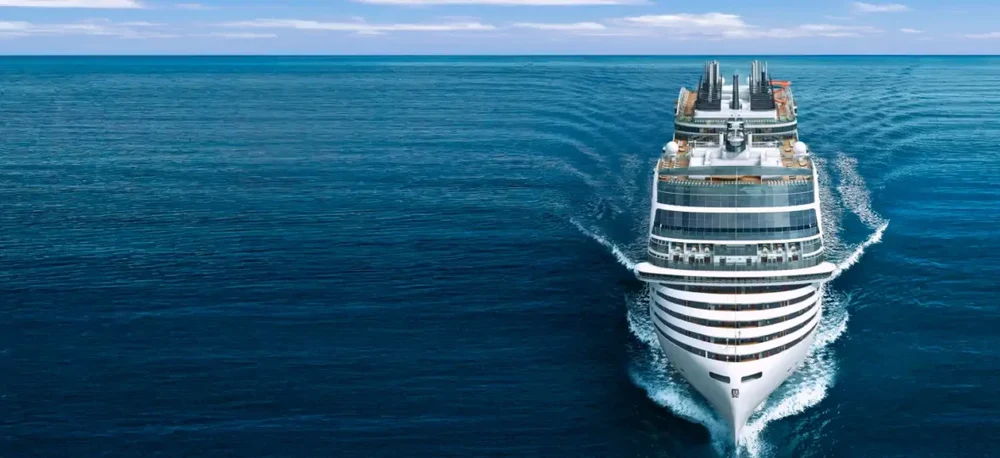Nautical Solid Oxide Fuel Cells: Testing and Demonstration
Project duration: Juni 2022 - July 2027
DLR is coordinating the HELENUS project. This project has the objective of developing and demonstrating a high-efficiency, low-emission 500 kW solid oxide fuel cell (SOFC) system on a large cruise vessel. This TRL 7 SOFC will serve as a model for future 20 MW systems. In cogeneration mode, it will produce power and heat with up to 23 % efficiency gains. Furthermore, HELENUS will demonstrate the fuel flexibility of SOFCs with renewable fuels across various maritime cycles. The collaboration of stakeholders will facilitate the advancement of climate-neutral shipping.

Fuel Cells of the Future
The maritime industry is responsible for 90 % of global trade and 2.5 % of global greenhouse gas emissions, as well as 13 % of the EU's transport emissions. To address this, the International Maritime Organisation (IMO) aims for a 50% reduction in GHG emissions by 2050 from 2008 levels. The European Commission's Fit for 55 initiative sets even higher goals, targeting a 55% reduction by 2030 and 90% by 2050 from 1990 levels. Achieving these targets requires adopting advanced energy technologies, renewable fuels, and energy-saving measures like onboard electrification.
The HELENUS project, focuses on developing a 500 kW Solid Oxide Fuel Cell (SOFC) for an MSC World Europa-class cruise vessel, integrated to produce both electricity and high-grade heat. The project aims to reach Technology Readiness Level (TRL) 7, with plans for further field testing to achieve TRL 8. If successful, this technology could scale up to 20 MW, offering over 23 % fuel savings compared to current systems that rely solely on internal combustion engines (ICEs). Additionally, the project will demonstrate the scalability of SOFC technology to 10 MW and beyond, with applications in dredging and offshore vessels. The fuel flexibility of the SOFC system with low-carbon maritime fuels will be tested, ensuring resilience for future energy transitions.
DLR coordinates the HELENUS project, overseeing project management and dissemination of research findings. Technically, DLR contributes to WP3 by focusing on modelling and algorithm development. Additionally, DLR leads WP4, demonstrating a 100 kW SOFC system in their laboratory across different maritime duty cycles and using renewable fuels.
The HELENUS consortium includes a wide range of stakeholders, from technology developers to field implementers, to drive innovation and commercialization. This project will pave the way to a decarbonized maritime future, enhancing innovation and significantly boosting the EU maritime industry's competitiveness.

Alma Clean Power
Expected Impact
- Commercialisation of SOFC products with an output of several megawatts for use at sea, including ship newbuilds
- Expand the use of SOFC technology in other forms of water transport, including inland and ocean shipping
- Accelerate the transition of the maritime sector to renewable and carbon-neutral fuels and thus facilitate decarbonisation
- Develop of a solid technological basis for classification societies to create and evaluate class rules for the integration of SOFC systems on large ships
- Provide a sound technological basis for policy makers, regulators and classification societies to adopt appropriate regulations to promote the deployment of clean energy systems
- Ensure the competitiveness of the European maritime industry by promoting the development and introduction of clean propulsion technologies
- Create a need for new qualified jobs for the operation of SOFC systems on ships and in harbours

HELENUS auf einen Blick
Project | HELENUS (High Efficiency Low Emission Nautical SOFC) |
|---|---|
Project partners |
|
Funding | Horizon Europe (Project No. 101056784) |
More information |
Project Video

HELENUS
Your consent to the storage of data ('cookies') is required for the playback of this video on Quickchannel.com. You can view and change your current data storage settings at any time under privacy.


The HELENUS project has received funding from the Horizon Europe Research and Innovation Programme under Grant Agreement 101056784.

